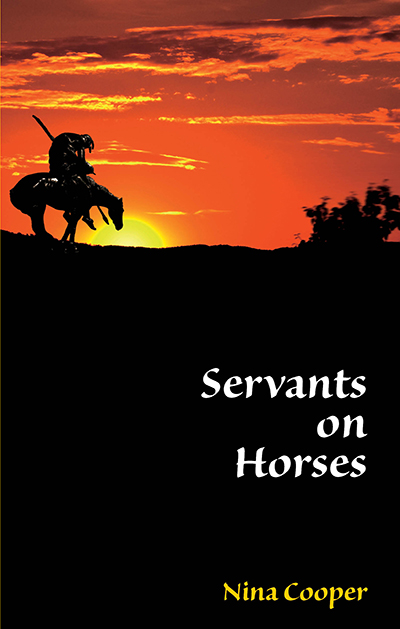
Nina Cooper
ISBN 9780980217544
$14.95
180 pages tradepaper
Available everywhere books are sold
The years preceding the Civil War were appallingly difficult for Native Americans. White man wanted their land. In spite of a Supreme Court ruling that treaties signed with The Five Nations were legal and binding, President Andrew Jackson ordered that the Indian lands be taken from them, and the Indians removed–or killed.
Andrew Jackson considered Indians to be savages, yet their culture was as civilized, if not more so, than the White man who wanted them removed. Servants on Horses is the story of one family’s struggle to survive and come to terms with the annihilation of their culture and the assimilation of generations into White man’s culture.
Nina Cooper holds a Ph. D. in contemporary French literature from the University of Texas at Austin. She wrote this novel based on her own family’s history and actual events.
Midwest Book Review
“Servants on Horses” is a complex retelling of the author’s great-great grandfather’s history as mixed blood member of the Muskogee nation in the era of the post Indian Removal Act of 1830. Based on historical records and the writings of memories the author’s grandmother, Eva Bailey on the occasions of her 93rd birthday, as told to a local county newspaper). This is the story of Uriah Pearson, of mixed White and Creek/Muskogee lineage, whose survival in a turbulent time in the American South sometimes depended on his ability to pass as either Indian or White. Tribal members fought Whites and Whites enforced unjust laws in the era of the Indian Removal Act of 1830, passed by Congress by just one vote in spite of a Supreme Court decision invalidating it. At stake is the cultural identity of the Creek Muskogee nation as well as many others Native nations, some warring, some peaceful. Also at issue is the ability of the surviving Muskogees and others to assimilate into the White culture, while in the process of either cooperating (by force) with land loss and resettlement and removal or facing annihilation. “Servants on Horses” makes for complicated reading, with the many swift, brutal changes, role reversals, and cultural transformations and betrayals. The title is taken from Ecclesiastes 10: 5-7 “There is an evil I have seen under the sun, an error which proceeds from the ruler. Folly is set in high dignity, and the rich sit in low place. I have seen servants on horses, and princes walking as servants on the earth.” No more fitting indictment of the Indian Removal Act and its sponsor and author, President Andrew Jackson, exists. “Servants on Horses” is a new side to this story told from the Natives’ viewpoint, as experienced by a survivor and his descendants. It adds immeasurably to the bloody accuracy of accepted histories. Also recommended by the same author is “Selected Letters of General Thomas Woodward’s Reminiscences 1857-1859, Regarding the Creek, or Muskogee, Indians of Alabama and Georgia,”